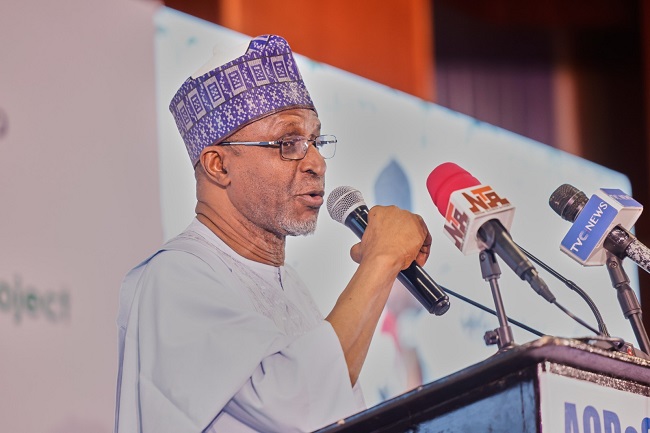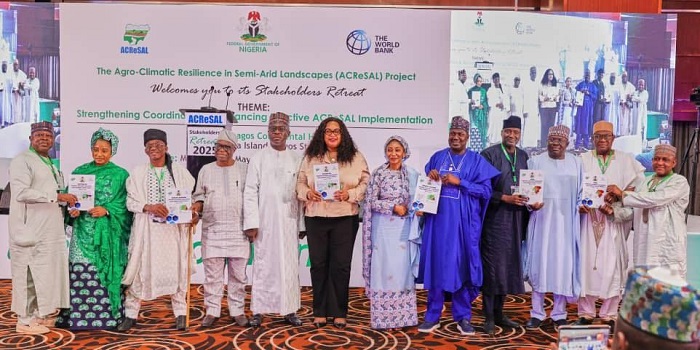The Federal Government has announced its intention to leverage the World Bank-supported Agro-Climatic Resilience in Semi-Arid Landscape (ACReSAL) Project as a key strategy to increase food security across Nigeria.

This declaration was made in Lagos on Thursday, May 15, 2025, by Malam Balarabe Abbas Lawal, the Minister of Environment, during the week-long ACReSAL Project-Wide Retreat for Steering and Technical Committees.
Lawal emphasised that the ACReSAL initiative directly addresses the severe impacts of climate change, particularly desert encroachment and land degradation prevalent in the 19 northern states and the Federal Capital Territory (FCT).
He highlighted a potential expansion of the project’s scope, stating, “We believe that rainwater harvesting is a significant area where ACReSAL could expand its efforts by promoting all-season farming, reducing reliance on rain-fed agriculture and consistent water availability to benefit the restoration of forests.”
The Minister acknowledged ACRESAL’s existing successes in enhancing food security and restoring degraded land. However, he further suggested that a stronger focus on rainwater harvesting could transform the challenge of devastating floods into a valuable resource for both agriculture and environmental sustainability.

Also speaking at the retreat, Senator Dr. Sabi Aliyu Abdullahi, the Minister of State for Agriculture & Food Security, lauded the significant progress made by the ACReSAL Project in promoting sustainable agriculture and food security in Northern Nigeria.
“Through collective efforts, we have empowered communities to adopt climate-resilient practices, revitalized degraded lands, and strengthened food systems in 19 states and the FCT,” he affirmed.
Senator Abdullahi underscored the alignment of the ACReSAL initiative with the current administration’s Renewed Hope Agenda, which prioritises agricultural transformation and food security as crucial elements of national development.
“By tackling land degradation and climate challenges, we are not only securing livelihoods but also building a foundation for a more prosperous and resilient Nigeria,” he stated.
Meanwhile, Dr. Joy Iganya Agene, Task Team Leader for ACReSAL and Senior Environmental Specialist at the World Bank, conveyed her positive assessment of the ACReSAL Project, stating that its performance in the initial two years has been satisfactory, with tangible benefits already being felt across participating states.
In her welcome remarks, Dr. Agene highlighted the project’s success in healing the land using the Halfmoon regenerative agriculture approach in Adamawa State, mitigating flooding challenges in several states, including Katsina and Kaduna. She emphasised that ACReSAL’s interventions have demonstrably prevented the tragic loss of lives previously experienced due to severe flooding in these regions.
“Today we can say, after two years, the ship has sailed that we have delivered almost 200,000 degraded landscapes out of 1 million Project target,” Dr. Agene stated.
During the just concluded ACReSAL’s Project-Wide Stakeholders Retreat in Lagos, a key activity was the validation of the Rima, Sokoto-Zamfara, and Gulbin-Ka strategic catchment management plans.
This milestone was achieved through collaborative efforts under the leadership of Senator Dr. Sabi Aliyu Abdullahi, Minister of State for Agriculture and Food Security, and Babarinde Segun Mukaila, Director of Water Supply, Federal Ministry of Water Resources and Sanitation, representing the Minister of Water Resources and Sanitation.
Strategic catchment management plans offer a unified framework for sustainable land and water resource use, focusing on climate resilience, ecological restoration, and livelihood development. These plans prioritize community participation, gender and social inclusion, and multi-level governance to ensure ownership and accountability.
The implementation of these plans under the ACReSAL project serves as a scalable model for integrated watershed planning across Nigeria. Specifically, the project is developing 20 Strategic Catchment Management Plans at the macro level across the 19 northern states and the Federal Capital Territory, with nine already completed.
Additionally, 200 plans will be developed at the micro-catchment level.
These initiatives underscore the ACReSAL project’s innovative approach to promoting sustainable land and water resource management, climate resilience, and livelihood development through unified planning frameworks.
ACReSAL is a multi-faceted interventionist initiative championed by the Federal Government, under the leadership of the Ministers of Environment, Agriculture, and Water Resources, and with the active participation of the 19 state governors and the Minister of the Federal Capital Territory.
The project components encompass dryland management, community climate resilience, institutional strengthening and project management.
The retreat offered a valuable opportunity for stakeholders to discuss strategies for enhancing coordination, fostering collaboration, and ensuring the sustainability of ACReSAL project gains and resources.
By Ajibola Adedoye
